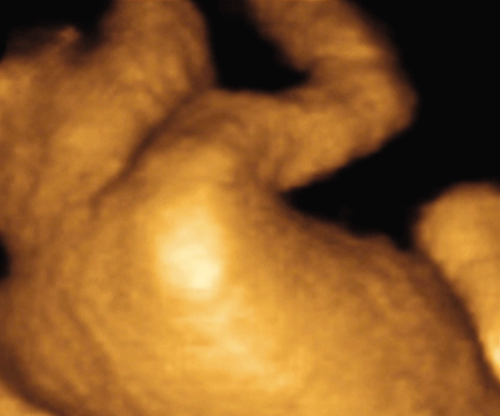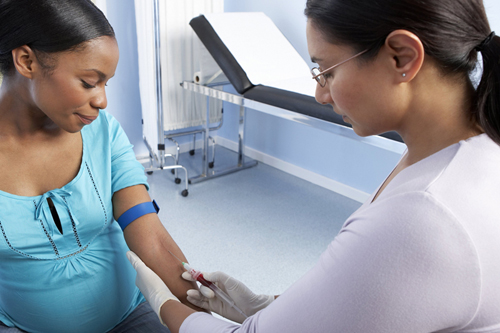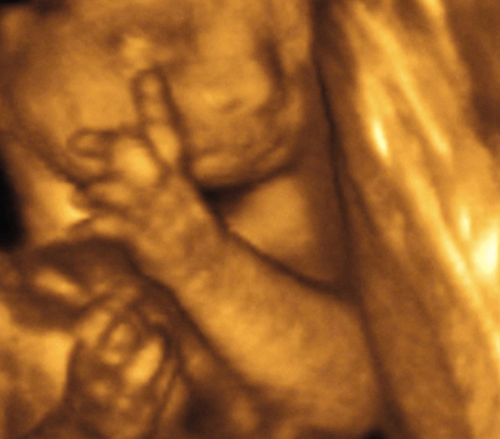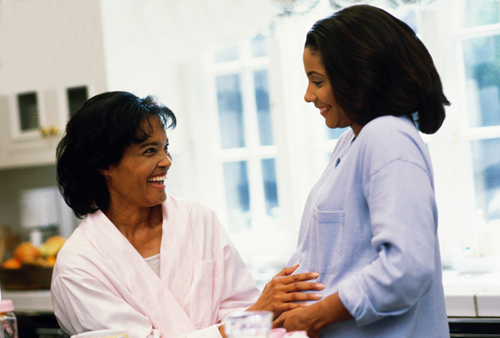You are 27 Weeks and 4 Days 87 days to go…
Your baby is growing eyebrows and eyelashes—and hair on her head—and making good use of all the space in your uterus.
Your baby today
This baby’s back is turned and she’s facing away from the
ultrasound scanner. The skin is much less transparent than before since
your baby is constantly laying down fat reserves beneath it. This fat
accounts, in part, for much of your baby’s weight gain from now on.

Your baby’s eyes are now open, and both the eyebrows and the eyelashes have grown. The hair on your baby’s head continues to get longer.
It’s quite likely that
your baby is making use of all the space available and may well be in a
breech position (bottom down), at least some of the time. This is the
case in a third of pregnancies at this stage but your baby’s position is
unlikely to stabilize until after 36 or 37 weeks. Because the shape of
your uterus naturally favors a head-down position, only 3 to 4 percent
of babies remain in the breech position after 37 weeks. It may be quite
difficult for you (and your doctor) to tell the position of your baby at
this stage. For example, just because the feet kick you in one
particular place doesn’t tell you much about your baby’s position. She
is very flexible and an ultrasound might show that she is doubled up
with her feet on her head.
Blood tests
Some time between 26 and 30 weeks
your blood will be tested to check that you aren’t anemic. If you are
found to be anemic your doctor may prescribe iron pills for you. Because
of an increase in the fluid content of your blood, your hemoglobin
count is likely to fall later on in your pregnancy, so it’s a good idea
to address this issue now. Iron pills can cause digestive problems, such
as constipation or diarrhea, so if this happens to you, ask your doctor
if your prescription can be changed. The liquid medications available
over the counter are kinder on the digestive system than pills, so ask
your doctor if one of these is appropriate for you. If a previous blood
test has shown that you’re Rh negative, you’ll receive an injection of
Rh immunoglobulin (RhIg) at around 28–34 weeks. You’ll get another shot
after the baby is born.

… Your health
Pelvic girdle pain
You know you’ve got pelvic girdle pain—or PGP—when sneezing hurts, you’re waddling like an old woman, and turning over in bed is a major task .
Formerly known as SPD, or symphysis pubis dysfunction, PGP affects one
in five pregnant women. It’s caused by hormonal changes that change the
way the pelvic joint functions and it can be extremely painful. Try the
following if you have PGP:
Keep your legs together when getting in and out of bed or the car (place a plastic bag on the seat to help you swivel).
Sleep on your side with a pillow between your legs.
Wear comfortable shoes.
Avoid doing tasks that hurt, such as housework or pushing a supermarket cart.
Relax in warm water.
Ask your doctor for a support belt to help ease the pain.
Get some therapy: studies show that physical therapy and acupuncture may help symphysis pubis dysfunction.
You are 27 Weeks and 5 Days 86 days to go…
Deciding to go it alone is never an easy option, but with the right support, you can look forward happily to your baby’s birth.
Your baby today
A finger is held close to the eye in this image. The eyes are
shut for most of the time but also a simple reflex action will prevent a
stray finger (or toe) from touching the eye. Furthermore, the
fingernails are still well away from the fingertips at this time.

It’s reassuring to know
that many women have babies on their own and do not find life an
endless struggle. Although it would be wrong to pretend that parenting
alone is as easy as it is when you share the care, with additional
support it is possible. Even if you are in a relationship, you may feel
you are going it alone at times. You may have very strong reasons why
you want a baby, for example your increasing age, and this determination
will give you strength and focus.
It is helpful for all
pregnant women to find someone to talk to and confide in. This could be
your mother or a close friend or relative. As you are making
far-reaching decisions about your future, it’s important that you have
support, accurate information, and time to think things through without
fear, panic, or pressure from others. Finding somebody you really trust
and whom you know can give you support when you need it—especially in
labor and in the first days and weeks with your baby—may help relieve
any pressure you are under. It will also enable you to think more calmly
and clearly about your situation and make plans.
It’s worth, even at
this early stage, starting to think about who you would like to ask to
be your birth partner: this is a big decision that should not be rushed.
Building a support network
It’s important for all pregnant women to have emotional and practical support, and this is especially true if you’re single.
You may find an added bonus of having a baby on your own is that it reshapes your relationship with your own mother, and you may talk together more often.

Go to all your prenatal appointments and build a relationship with your doctor; she is an invaluable source of information.
Sign up for prenatal classes.
If you’re single, you may find that daytime courses are less populated
by “couples”; this gives you a chance to build up a network of female
friends. Also try to go to classes, such as yoga and water aerobics.
Give plenty of thought
to choosing your birth partner: a trusted friend, or perhaps your own
mother, who is likely to be thrilled to be asked to share this
experience with you.
Don’t be too proud to accept offers of help from friends and family—most will genuinely want to be involved now and after the birth.